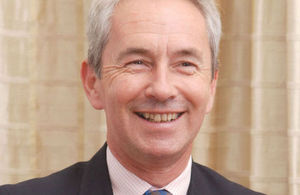Afghanistan feel just like any other democracy at election time
An op-ed by British Ambassador to Afghanistan Sir Richard Stagg on the upcoming elections in Afghanistan.

British Ambassador to Afghanistan Sir Richard Stagg
As an Ambassador, one of my duties is to explain to people in Britain what is going on in Afghanistan. For them, as for my neighbours in Kabul, the hot topic is the upcoming elections.
Seeing candidates’ posters across Kabul, and watching them debate on television makes Afghanistan feel just like any other democracy at election time, such as Britain, or India, where I used to work. I have to remind myself that, up until 10 years ago, Afghans had never had a free choice of leader – only Governments imposed by force, like the Taleban and the Communists.
On 5 April, every adult Afghan, male and female, from every region and background, will have the right to vote. Every vote will count equally, whether it is cast by a farmer or a Minister.
Many people already know who they want to vote for. Others are waiting to see what the candidates say. But nobody knows the result. That is the essence of democracy.
Some people say they are worried that they may not be able to vote, or that there will be cheating or interference. Of course, any election here brings challenges. But my strong impression is that those involved – the election authorities, the Government, the international community – have learned the necessary lessons from the past.
Preparations are going well. A major effort is underway to ensure that people can vote. Over 3.5 million new voter cards have been issued, a third of them to women. The security forces and election authorities are working closely together to ensure that polling centres will be open on Election Day – and they say that the vast majority will be.
It will be much harder to commit fraud than in any previous election. The new ballot papers should be impossible to copy. They will be stored securely, and tracked every time they are moved. There will be thousands of independent observers at polling stations across the country.
Just as important, the members of the Independent Electoral Commission, the Independent Electoral Complaints Commission and the Media Commission have promised to do an honest job. Much work remains to be done, but they are far better prepared for these elections than for any in the past.
I agree strongly with those who say that a key requirement for success is that there should be no interference. The Government has promised that the election will be held on time, and its resources will not be used on behalf of any candidate. That is essential, and every Afghan I meet is determined to hold the Government to its word.
Equally crucial is that there must be no interference by foreigners trying to influence the outcome. Afghans have suffered immensely at the hands of outsiders, so I understand why people worry about this.
For Britain’s part, I can say with authority that we will not help any of the candidates. We have no preferred result. The decision about who should govern Afghanistan for the next five years is one for the Afghan people alone. Afghans are far better able than anyone else to choose the right person to be their President. The only legitimate role for the international community is to help support a good election.
In Britain’s case, we are working to do just that. We are, for example, spending over $30m, through the United Nations, to help Afghan electoral institutions to organise the voting. We are supporting Afghan organisations to deploy impartial election observers who will help combat fraud, and to raise awareness of the election and the issues at stake. We will also help women to address the problems they face in standing for Provincial Council seats. And, through ISAF, our military forces stand ready to move election materials to remote areas if asked by the Afghan authorities. Our aim is to enable the Afghan people to have their say. We are not funding any campaign. Nor will we endorse any candidate.
These forthcoming elections are historic. This is the first time that an Afghan President has agreed to stand aside, as the Constitution requires, and let the people choose his successor. That would have been unthinkable a decade ago. I wish all involved the very best of luck.
For further information please contact:
Sheena Lavery, Mobile: 0796666060, E-mail: sheena.lavery@fco.gsi.gov.uk
Emal Maqsood, Mobile: 0700379741, E-mail: emal.maqsood@fco.gov.uk